
Final Year Project (FYP) 101: Pre-FYP Preparation
- Published on
- Muhd Rahiman · 35 min read

Table of Contents
Introduction
This blog post provides a comprehensive guide and walkthrough of my Final Year Project (FYP) experience for the past 2 semesters.
It is intended to not only serve as a reference for those who will embark on a similar journey but also act as proper documentation for archiving all my knowledge and experience before memory fades (I have a memory of a goldfish).
Before that, full disclaimers:
- All views expressed in this post are my own. This article showcases my own subjective view and apart from the backing of my credibility, it does not represent the faculty's official recommendations or views whatsoever.
- My sharing is grounded or limited on the context of FYP in FCSIT UM for the Software Engineering department only and may not be fully applicable to those from other institutions or even other disciplines of my faculty.
- The focus of this blog is more about sharing the things that are often left out/only discovered after going through FYP that I felt everyone should know in advance/hindsight and less about the technical things that you will eventually be briefed by the faculty's FYP coordinator before the start of your FYP.
- Please keep in mind that FYP like most subject matters can be incredibly nuanced and no single anecdote or guide including this one can be exhaustive and comprehensive enough to cover everything.
- If there are any inaccuracies in the information that is provided in this post or any future posts in the article series, please do not hesitate to message me personally and correct me.
This article series will be divided into several parts for easy readability, starting with the first one regarding pre-FYP preparation.
Without further ado, let's get right into it!
Who Am I?
Before we dive into the content of the blog itself, I feel obliged to first briefly introduce myself to prove my credibility. After all, why should you trust my opinion/judgement?
I am a recent graduate (fresh from the oven) of FCSIT UM who currently works as a Software Engineer at Dell Technologies Malaysia, based in Cyberjaya.
When it comes to my Final Year Project (FYP), I managed to obtain an A+ for both my FYP1 and FYP2.
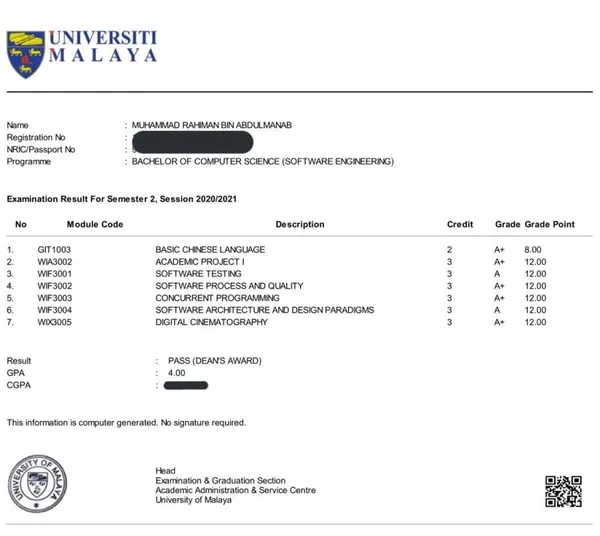
On top of that, my project has also received multiple accolades including Gold Medal Winner (Young Ideation Category) for International Digital Innovation in Wellness (DInoWEx2021) and Champion (IET Innovation Award) & Second Runner Up (Young Innovator Award) for IEEE Malaysia Final Year Project (FYP) Competition 2021.
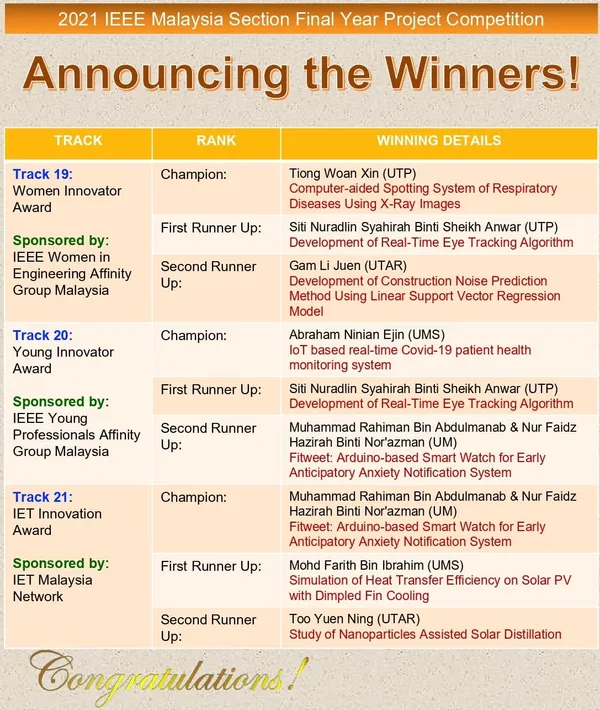
So in some ways, I think I hold some degree of qualifications to provide some handy tips and tricks on how to survive your FYP which is undoubtedly going to be the hardest phase of your degree life (which is kind of expected). Of course, I'm not always right so reader's discretion is very much advised.
Part 1: Pre-FYP Preparation
FYP1 vs. FYP2
In case you don't know, FYP (or officially called Academic Project in the course plan) in FCSIT UM is being divided into 2 parts: Academic Project I and Academic Project II. Throughout not only this blog post but also the entire article series, I will refer to these two with their colloquial terms FYP1 and FYP2 respectively.
I will not go too deep into the details of the difference between the two, as everyone will eventually be briefed by the faculty's FYP coordinator regarding this, via this PDF linked from the coordinator's site. Note that the contents of the slides are a bit outdated (it still uses screenshots of the old Ilmiah system) and therefore will be subjected to changes in the future.
The following is an excerpt of the slide showing an overview of the differences between FYP1 and FYP2:
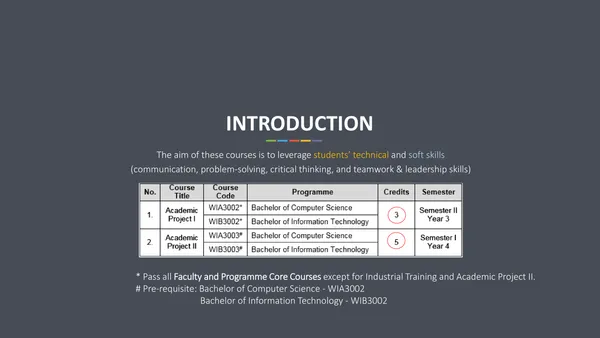
As you can see, FYP2 is being allocated more credit hours (5) compared to FYP1 (3). This is because most of the development of your system will occur during FYP2 instead of FYP1, where you will mostly be dealing with literature review research and outlining your project proposal.
It is also expected for you to take FYP1 and FYP2 during your 6th and 7th (final) semester as outlined in the course plan, though this is not set in stone as others may either take these courses early (due to postponing their industrial training) or later (going for exchange). Please also note that FCSIT UM Data Science students will be taking their FYP first before undergoing their internship.
Finally, you can see the weightage for the evaluation for each course. Both FYP1 and FYP2 have the same assessment components, where 60% will be evaluated by the appointed panels by each department FYP coordinator through your final presentation and viva session while the remaining 40% will be assessed entirely by your own supervisor for the final report submission.
Although FYP1 and FYP2 are separate courses, it does not mean that you will conduct 2 separate projects. Instead, it is a continuous development of a single project across the span of 2 semesters with separate evaluations. If you screw up your FYP1, you still have a chance to redeem yourself in FYP2.
I will spare the in-depth details regarding FYP1 and FYP2 in later parts of this article series. As I mentioned in my disclaimer, they will be focusing more on my experience. I will not go through much of the stuff that I'm sure that the faculty's FYP coordinator will brief further in detail and with more updated information later on.
IPPI vs, Conventional FYP
While almost everyone knows that FYP is divided into 2 separate courses, very few know that there are 2 types of FYP that FCSIT UM students can undertake in the faculty.
The first one is what I would call a conventional FYP (or sometimes just known as normal FYP). This is what ~99% of students including myself will most likely take.
The second type which is often unheard of until the day of the FYP1 briefing is Innovative Product Project Initiative (IPPI), a special FYP programme proposed by the faculty. It is an initiative to produce final year projects that are focusing more towards product innovation, prioritising commercialisation and marketability through active involvement with the industry.
The following screenshots summarise IPPI. IPPI projects must be conducted in a group of usually 3-5 cross-majoring students unlike normal FYP. Cross-majoring means that all group members must come from different departments. Because of the involvement of students from different departments, there will be multiple supervisors in a team as each student will have their supervisor.
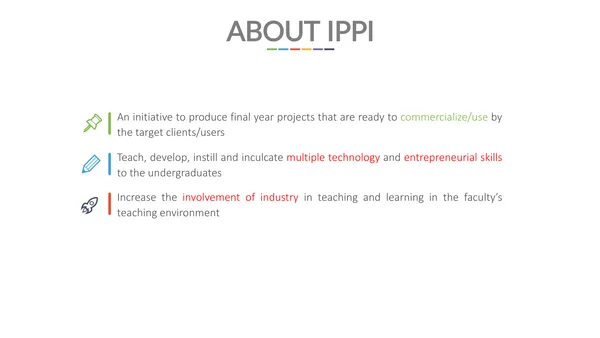
The project title will also come from industrial partners (usually big ones), therefore your stakeholders will also come from the industry. That is not the case for conventional FYP as the title will first be proposed by the supervisor and students can choose to collaborate with not just industrial representatives but also individuals from other organisations or domains as long as they can aid you in acquiring requirements for the project.

The idea behind this implementation is that students from different disciplines can work together and combine their unique skill sets to come up with an innovative project that is ready for commercialisation.
For example, one of my friends from Software Engineering took IPPI as his FYP in collaboration with Malaysia Airports. In that project, he is in charge of developing the mobile application part of the system. The Artificial Intelligence department representative will develop a recommendation system while his teammate from Information Systems will handle the web application as well as data visualisation and analytics.
The following table shows the summary of the key differences between IPPI and conventional FYP:
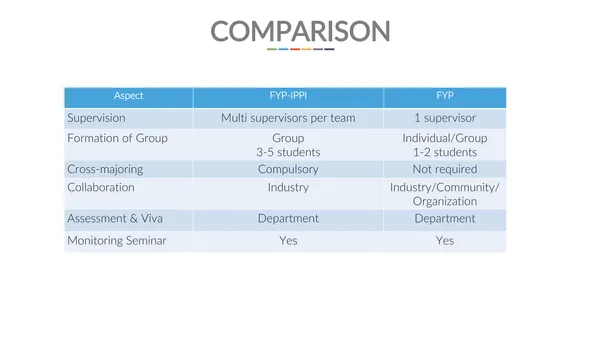
As for which one is better, I cannot say for sure as I'm only limited to my experience in conducting my FYP conventionally. The biggest advantage of IPPI that I can see is the valuable experience that you can get from collaborating directly and more closely with the industry. Though, keep in mind that this is not unique to just IPPI per se as you can still collaborate with industrial representatives as your stakeholders for conventional FYP.
In my opinion, you should only take IPPI if you are the type that not only prefers to work in a group, but can handle the pressure of working alongside the industry.
If you want to know about IPPI from a student's perspective, feel free to contact me personally for me to provide you with my friend's contact number.
Solo vs. Duo vs. Group: Which is Better?
One of the initial dilemmas way before the FYP journey even began (as early as during my second year) was deciding on whether I wanted to do my FYP alone, together with a partner or in a group.
Some of my peers once remarked that they expected me to conduct my FYP solo because they felt that I seem to be the lone wolf type and I need not rely on anyone else since I'm fully capable of doing things on my own.
While their inference is incorrect; that my instinct is almost always to try and tackle things alone, I decided to go against my general preference for FYP and instead choose to do it with a partner for a few reasons:
-
"If you want to go fast, go alone. If you want to go far, go together"
Some of you might be familiar with this adage before. To me, it sums up perfectly the main reason why I decided not to do my FYP alone. Despite my personal preference to work alone, I can't refute the benefits of effective collaboration with others and how they can outweigh the advantages of working independently.
The sharing of different ideas and perspectives can not only serve as a check-and-balance or quality control to your understanding and progress, but it can also indirectly bring out more of your inner potential.
In software engineering specifically software testing, there is this popular technique known as rubber duck debugging. This debugging method asks you to explain your code in the simplest terms line by line as if you're speaking to a cute yet uninformed rubber duck (hence the name). When you present your work to others, they can help scrutinise and spot your misconceptions and biases, helping you get back on track more quickly. I can vouch for this from my personal experience.
It’s a common misconception that software engineering is a solitary field. In one of the sharing sessions I attended during my 6th semester, I was informed that Dell employs pair programming culture among its employees (which I’m truly relieved knowing). I doubt that Dell is the only company practising this approach, and one can't help but wonder why software companies emphasise collaboration so much. Perhaps, some of the rationales include the ones I mentioned earlier.
Of course, working alone has its perks. But, there's no denying that while you can do a lot by yourself, you can do the impossible with a great team. Simple arithmetic even proves that. Only amongst the many, can you achieve greater heights.
-
Found myself a reliable partner
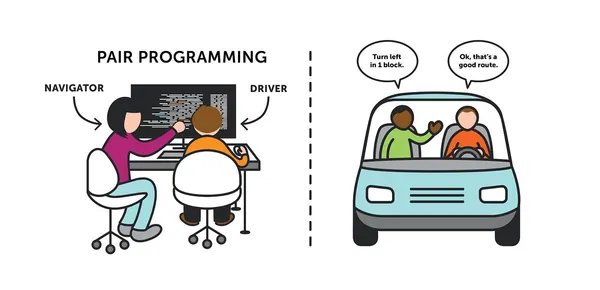
The first point heavily relies on the assumption that whomever you teamed up with has synergy in working alongside you. There's always a risk that this person may drag you down instead of propelling you towards success.
This leads to my circumstance where I found myself incredibly lucky to have a friend that is undoubtedly compatible with me in many ways, particularly towards my work ethic. As a self-proclaimed workaholic, I concede that my work regiment is not everyone's cup of tea. But after years of working together on group assignments since we were in the first year, I knew that I can place my trust in my friend Faidz Hazirah on nearly everything.
That being said, not everyone has the privilege of having someone that they can rely on both work and personal matters. I'm sure we enjoy our friends' company for leisure purposes, but we wouldn’t necessarily want to work with them if given the chance. In other words, one can be a good friend but a terrible colleague (and vice versa). For me, I happened to strike gold by finding a person who can do both.
Because of this, if you decide on doing your FYP with a partner or in a group, do take note of this human factor. Be sure that you can work well through thick and thin with whomever you will be teamed up with, which by the way you yourself get to decide; not your supervisor or anyone else.
Remember that this arduous journey will last 2 semesters, so you will be stuck with whomever you chose for roughly 1 year. If someone pops up in mind that seems to check all the boxes, then good for you! Otherwise, you have to go back to the drawing board and think further.
-
Desire to challenge myself with more complex projects
At first glance, this point might be more suited towards convincing oneself to do your FYP alone but hear me out.
Generally speaking, the complexity of a project title is directly proportional to how many students are required in undertaking said title. In other words, the more students are involved, the more difficult or the bigger the scope of the project title is expected to be.
Therefore, if you decide to conduct your FYP either with a partner or in a group of 3/4 (the maximum that I heard of is 4 members per group), you have to justify the need for that many 'human resources' from the complexity of the project title that you either propose on your own or obtained from your chosen supervisor.
This is a common issue encountered by many final year students including myself, where the panels will point out during viva session (usually in FYP1) that the project requirements or proposed modules are insufficient/not complex enough; that they don't make full use of the number of students involved and the project can easily be done by 1 person only. That is why, generally it's easier for the panels to appreciate a complex project achieved by a single student compared to the same project developed by a group of students, which is undoubtedly an advantage for lone rangers out there.
Some supervisors went so far as to not recommend that students form a group for FYP and limit the number of students to a maximum of 2 (except for IPPI) out of concern that the students could not come up with a complex enough system, at least for the Software Engineering department in FCSIT UM. I was told that some universities even only allow their students to conduct FYP alone for CS/IT degrees.
Despite the risk, I decided to go ahead anyway and try to find an existing title or propose my own that is as complex as possible as a starting point. Sure, I can do the same while doing my FYP independently, but working with a partner indirectly incentivises me to constantly figure out how else can this project be improved in terms of complexity.
-
FYP is a lonely journey

This last justification somewhat relates to my second point but focuses more on the personal side of things.
Trust me when I say this; FYP can be a lonely journey if you don't have someone to talk to. Now that I've completed mine, I really cannot imagine going through all of the hurdles alone without having to occasionally rant about my struggles to my partner.
Pair programming allows me to freely express my problems—both personal and work-related—to someone who can empathise and potentially help solve those problems so that I won't be stuck spinning my wheels all day.
Of course, the astute of you might rebut by saying that the need to have someone to communicate your issues with and conduct your FYP alone are not mutually exclusive. Meaning, you can still work on your FYP solo and talk to your friends about it.
While that is true, it is only so to a certain extent. There's only so much that your other friends can relate to and therefore help. For example, if they're not from CS/IT background, obviously they can't help you with your code. Even if they are your peers from the same discipline, keep in mind that they too have their FYPs to handle. It would be unwise to expect that they can help you with the same level of detail and granularity when seeking help from your teammate.
Besides, I do not want to spend my final year mostly alone while staring at the pixels on my screen for hours on end. At the very least, by having a partner, the journey won't be as bleak and boring. After all, the more the merrier, am I right?
These are my personal reasons for undergoing my FYP with a partner. This differs on an individual basis, and you may disagree with some of my rationales. It is not my intention in this post to claim that working with a partner will always be the best way forward. At the end of the day, what matters most is your own preference, and whatever floats your boat.
Choosing your Project Title
Another important step towards your FYP journey is... well, deciding what project you want to pursue.
At least in FCSIT UM, students are allowed to either choose an existing title provided by a supervisor, or propose their own to the supervisor of their choice.
Picking an existing title is the most popular among students and arguably the default option, which is what I will cover first. Generally, all lecturers or supervisors of each department in the faculty are required to supervise a certain number of students, and therefore will need to provide several titles for the students to choose from. This is to ensure that there are going to be enough titles available to cater for everyone, at least ideally speaking.
For FCSIT UM students, you can view the list of all published titles for each department from the recently revamped FCSIT UM Ilmiah site by clicking the Project link at the top navigation bar. And yes, you don't have to log in to do just that. Your login credentials will be given by the faculty's FYP coordinator during the briefing held before the start of FYP1, which is compulsory for all final-year students who will be taking FYP1 to attend. You mostly need to log in to submit your FYP deliverables notably the Google Drive links to your monitoring presentation, final presentation and final report.
Once you found a project title that piqued your interest, you can reserve/confirm the title by contacting the corresponding supervisor preferably via email (as of the time of writing, the Ilmiah system does not have a built-in reservation system).
I highly recommend that you set up a meeting with your potential supervisors first notifying them of your interest to know more about the titles before jumping straight to reserving a title so that you can discuss more in-depth regarding the corresponding project title. After all, there's only so much that an email conversation can carry before it becomes too bloated. Plus, it may also indirectly give off a good impression to them that you're enthusiastic in your pursuit of choosing your project title.
I do also need to emphasise that if you decide to back off and not proceed with a supervisor's project title after notifying them of your interest, you can do so as long as you haven't confirmed anything with them and your title has not been updated inside Ilmiah. Please do not hesitate to contact them and tell them the truth instead of leaving them in the dark, which is disrespectful. Don't worry about disheartening them as most of them will understand that you're just surveying around. It is your right to know the details of each project title and ultimately choose whichever one you prefer.
If however, you wish to change your project title after it has been confirmed with your supervisor and reflected inside Ilmiah, unfortunately, I believe you cannot do so. But, you can try out your luck by approaching the faculty's FYP coordinator and describing your situation.
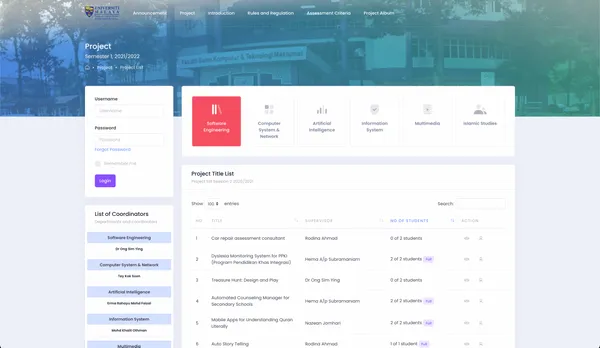
Now, it goes without saying that a student can only secure 1 project title (why on earth would anyone want more) and a project title can have multiple students. But, one unspoken (and rather unpopular) fact is that not all project titles are the same. Meaning, some project titles are—at least on the surface—inherently better than others in many ways such as based on the following self-outlined criteria:
- Originality
- Commercial value
- Relevancy
- Complexity
- Gravity/strength of problem statements
- Value of proposed product/solution.
Take the complexity of the project for example. Different project titles have different ways to justify their complexity. For instance, some may incorporate elements of data science and machine learning (e.g. developing their model, building a recommendation system), cloud computing (e.g. using technologies from AWS, Azure) or even developing both a web and mobile application of the same system (although this last example is a bit controversial; more on this later).
Because not all project titles are created equal, and the reservation of these titles comes on a first-come-first-serve basis, you have to move fast if you want to secure some of the best/most interesting ones. For your information, the titles will be published sometime around the first week of the semester and you're only given 3-4 weeks after the semester commences to select the title of your choice (the earlier, the better so that you can start your FYP1 literature review research early).
However, what most students are unaware of is that all project titles proposed by the supervisors have to be submitted, vetted and approved by the faculty's FYP coordinator first before being published in the Ilmiah system. Usually, the supervisors will have to submit their titles a few weeks before the semester begins. This means that you can scout for the titles early before the start of the semester to gain the first mover advantage, and hopefully, be able to get some titles reserved for you.
And that's precisely what my partner and I did before FYP1 started. Rather than wait for the titles of all supervisors to appear in Ilmiah, we took the liberty of emailing some of the supervisors that we know of (8 in total, as shown in the screenshot below).
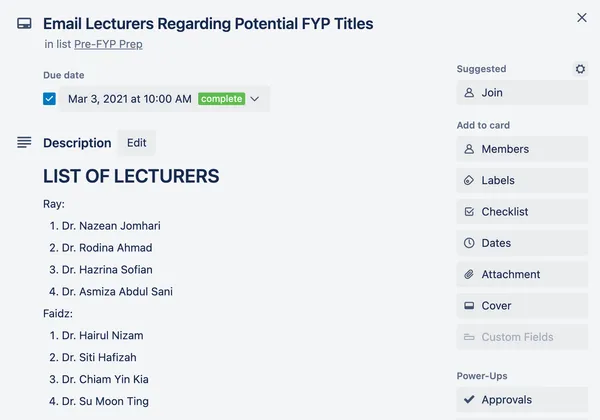
Keep in mind that, not all lecturers may have their titles ready by the time you emailed them as they might have not been approved by the FYP coordinator yet and therefore may not even be willing to release their titles early. But from our experience, most if not all of the lecturers are fine with it. Some even commended our effort for approaching supervisors early! You can see from the screenshots below an excerpt of the email we sent as well as the replies we got from some of the supervisors.
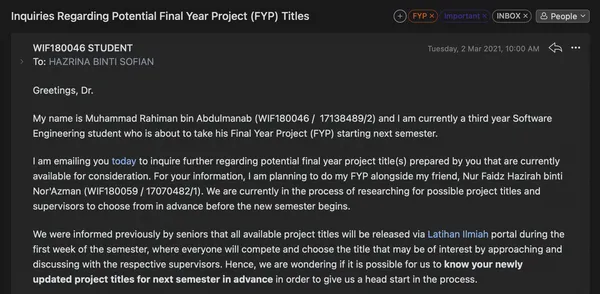
It was through this approach that I managed to secure my FYP title. In case you're curious about what made me choose the title that I had, this is a summary of the key reasons why (related to the title itself):
- It's not just pure web development
I knew from the very beginning that I didn't want my FYP to merely be a CRUD-heavy web-based system (I mean no disrespect to my peers or seniors who developed such a system for their FYP). My rationale was that it'd be nothing but just an amplified version of my previous Web Programming course assignment. I felt that FYP is my final opportunity to diversify my skill set and branch out into other areas of computer science such as machine learning and cloud computing as it's highly unlikely that I would get such a chance when I'm working later.
- 'Wow' factor and originality
According to my soon-to-be-supervisor during our short preliminary meeting before we confirmed our title with her, the research involved in our project title is novel and has never been done before (and this has been confirmed further in our FYP1 literature review).
The idea that my partner and I will be bringing something new onto the table is deeply intriguing. In some weird way, we felt it in our guts at the time when we were surveying titles that this particular project can go far.
That being said, please do not mistake my reasoning as implying that only fully original projects are good ones. That could not stray further from the truth. Just because your proposed system is new doesn't always mean that it's good.
Similar systems related to your project could have already existed in the status quo (in fact, that's most likely the case) and you can still add the 'wow' factor by improving it further. How to do that and what exactly defines a 'wow' factor depends a lot on the project that you will be doing and it's part of the challenge of doing your FYP.
- Complexity in Scope
As mentioned earlier, the complexity of your system also affects the evaluation of your FYP. Because our project involves both machine learning and the Internet of Things (IoT), my partner and I were confident that this alone will help in increasing the level of complexity of our project.
Of course, that doesn't mean you have to incorporate ML or cloud technologies to make your project complex. For Software Engineering students, there is also a risk of adding elements which do not have much relation to our discipline. For instance, some panels in the SE department may not be able to fully comprehend and appreciate the machine learning work that you've done as it's mostly back-end work. To them, it's merely just importing existing libraries and making it work when in reality it's so, so much more than that. Furthermore, if let's say you're a Software Engineering student, bear in mind that ultimately you will be evaluated based on your SE skills, not AI.
But as someone who did incorporate ML in his FYP, don't let that hinder you from stepping out of your comfort zone! If you want to explore ML in your FYP and your project necessitates using it, go ahead!
Even adding more CRUD-based modules to your web application can help increase the complexity. Other strategies that I noticed from my peers include developing a mobile app counterpart, adding gamification elements and integrating payment gateways.
Regardless of the method you choose to increase your system complexity, what you need to keep in mind is that you cannot simply increase your project complexity just for the sake of doing one. Whatever elements or modules you plan to add have to make sense in terms of the overall picture of how your system works.
Proposing your Own Project Title
As I mentioned previously, you can also propose your project title to your preferred supervisor. Sometimes, they may require you to provide a simple proposal for them to review or even mandate you to submit said proposal to the faculty's FYP coordinator for approval first before proceeding further.
Such was the case for my partner and I during our search for our project title. We prepared our proposals for 3 different project titles that we brainstormed ourselves as a backup in case none of the existing project titles in Ilmiah are to our taste. I've included one of them as an example for your reference.
The format is somewhat arbitrary and you don't necessarily have to follow the exact format in the example (I based mine on this format in case you want to refer). What matters most is the problem statement, objectives and proposed modules of the system. You can go for more detail but I suggest to keep it brief and concise as to not burden the lecturer reading it.
Choosing Existing Title vs. Proposing your Own: Which is Better?
For myself, I prioritise the supervisors' titles proposed in Ilmiah over my mostly on the basis that the supervisors most likely have given far more thought to their proposed titles than the ones we come up with ourselves (as amateurs, we lack insight). Proposing my own is more like a last resort, but it is all up to your preference.
Even if you have your ideas brewing inside your head since the very beginning, you can always try to choose the most relevant existing title as starting point and try to incorporate your ideas from there instead of starting from scratch. Perhaps some of those ideas can become additional modules and serve as extensions to the project instead of becoming its own project if that makes sense.
At the end of the day, you have to remember that the titles are not static in nature. Their brief descriptions are just initial impressions/plans and are intentionally not clearly defined. It is your job later especially during FYP1 to define the scope based on your literature review research, requirements elicited from your stakeholders and counsel from your supervisor.
So, don't judge them solely at face value and instead, think about their long-term potential. I've seen some of the titles taken by my peers that I initially passed on as boring that ended up becoming interesting when realised into a full-fledged system. You will almost definitely encounter some dilemmas in choosing your title, but I hope these tips and insight help to clear the doubt.
Choosing your Supervisor
When you decide on your project title, you cannot exclude the person behind the proposal of the title itself which is the supervisor. Just like how you can be picky in selecting who gets to be in your group assignment, you too can do the same when determining your future supervisor.
Choosing the right supervisor plays an important role not just in your FYP journey, but also even for postgraduate and doctoral research. They will be in charge of not only guiding your throughout the process but also evaluating you in terms of your final report submission and soft skills.
I've outlined 3 main aspects that I considered sharing with everyone:
-
Active vs. Passive
This first aspect depends a lot on one's preference. Active here refers to the type of supervision where the supervisor exerts a lot of control over your FYP. For example, the supervisor might have already secured and contacted stakeholders for you requires frequent meetings and updates and generally has pre-defined most of the scope and requirements of the project.
The biggest pros of this supervision style are that you don't have to do much apart from developing the system. All you have to do is just follow the path and roadmap already laid upon you. There's no need to start from scratch and find stakeholders on your own for example (though you still be in charge of liaising with them). I noticed that supervisors who adopted this approach are usually the ones where the stakeholders of their proposed project titles are their friends or colleagues.
The cons, however, is that you might have little say over how the project should chart its course. This type of supervision is what most students would say as 'strict'. Most of the requirements are already set in stone and aren't likely to change much if not at all, which makes these projects more suited towards the Waterfall SDLC model. They might also be critical towards the system design such as the diagrams (use case, class etc.), the wording of the individual requirements and the format and writing of the final report. If you wish to propose your changes or ideas, you will have to go through some level of scrutiny. There’s a higher tendency of the supervisor micro-managing your project.
Passive supervision on the other hand is a bit laid-back. The supervisor will most likely only intervene if you ask them to do so. Lecturers who fit this description tend to be very busy and therefore won't have as much free time to organise frequent meetings and scrutinise the most minute of matters.
This could be a good thing for those students (like myself) who prefer to be given as much room and freedom to develop the system and bring their ideas onto the table without much assistance from anyone else including your supervisor. It will feel more like your FYP will be your project rather than your supervisor's. Hence, if you're the independent type, then this supervision style might be for you.
That being said, the biggest downside is that you cannot expect to get a lot of guidance from your supervisor. Even if you did approach them, they will sometimes give short, generic answers and let you figure out the details on your own. I say that this is a con because no matter how much you wanted to stay independent, ultimately you cannot avoid asking for your supervisor's input in the project development. Getting a slow or non-specific response can drag your project's progress. I've heard some of my peers complain about how they were lulled into a false sense of comfort when their supervisors seem to be fine with nearly everything that they did after asking them to check, only to find out that the panels criticised them for it.
In reality, not all supervisors will fit this simplistic binary classification or characterisation of supervision style, which again is solely based on my observation. Ideally, the best type of supervision would be somewhere around the middle; they can give constructive feedback when asked and will not hesitate to entrust their students to develop the project. At the end of the day, it's up to you what fits your style best and that both your and your supervisor’s expectations match so that you can receive the best possible support.
-
Field of Expertise
Every lecturer has their fields of expertise based on the research that they have done. For UM lecturers, we can easily see their research focus or even dive into their publications and CV by searching their names from UMExpert.
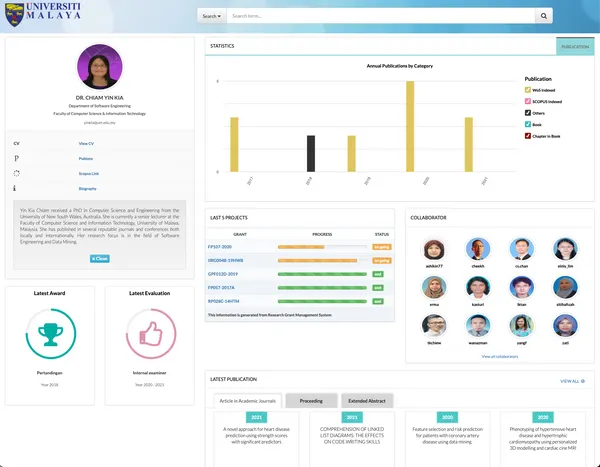
The reason why it's important to take into account a supervisor's experience and research interests is that you would want to ensure that your project title (especially if you propose your own) is aligned with their areas of expertise so that they can advise you better.
For example, if your project involves machine learning, surely a supervisor with ample experience in said field can provide more specific advice that's tailored to what you're doing compared to someone who does not have the slightest idea about it. Trust me, the quality of your supervisor's counsel can sometimes make or break your FYP.
Therefore, take some time to also consider a supervisor's expertise when scouting for one and don't just favour a supervisor simply because they're nice.
-
Number of students handled
This last factor considers how many students a given supervisor expects to handle for FYP during that semester. As I mentioned previously, by right all lecturers are given a certain quota to propose several project titles for students to choose from. But in reality, not all lecturers will propose a title/supervise any student due to reasons such as sabbatical leave. Even if they do, different lecturers will handle a different number of students. Some lecturers may supervise up to 10 students (individual/pair/group) while others may only supervise 1 or 2.
How does the number of students supervised by a lecturer affect your FYP experience?
Well, if your supervisor only supervises you and a few students, then they can allocate more time and attention to advising you on your project. You can have the flexibility to organise more frequent meetings and gain specific/personalised advice on how to go forward with your project.
Meanwhile, if your supervisor handles a lot of students, you cannot expect your supervisor to give 100% attention to your project alone. Meetings are also sometimes conducted together with students from other projects, where each project will take turns to report their progress which means you only have a small window of time to ask any questions.
For my FYP experience, I belonged in the first case as my partner and I were the only students that my supervisor handled. She initially proposed 2 project titles but we were the only ones who took up one of them. Hence, I can vouch that having a supervisor that does not handle too many students makes for a better FYP experience in my opinion. I know that my supervisor can take time to go through all my work and questions and respond with a thorough answer instead of a half-assed one (no offence).
These are just some of the factors that I considered. Please note that just because your chosen supervisor doesn't agree with the criteria mentioned above doesn't mean it's game over. There's so much more about your FYP that's arguably more crucial than your supervisor as discussed in the next part.
Choosing Project Title vs. Supervisor: Which to Prioritise?
While I was surveying for my project titles, I found myself in a somewhat unexpected predicament. I knew exactly what to consider for shortlisting a project title and supervisor, but I never thought about prioritising which one, especially if I'm stuck in choosing between the two: A really interesting project title but proposed by a supervisor in which supervision style is not my cup of tea, versus securing a supervisor whom I like working with but has decent project titles.
In this situation, it can be difficult to know at first which one is more important. But if you ask me, you should always prioritise the project title first before the supervisor. This includes factoring in whether the title suits your interest or passion.
From my experience, at some of the lowest moments of your FYP journey, sometimes the passion that you had when you chose the title is the main if not the only thing that can motivate you. Not whether or not your supervisor is nice to you or is lenient in giving marks. In other words, whether the project title resonates with your interest will carry you a long way.
So, it's fine if you chose a project title that you like, but your eventual supervisor may or may not be your first choice or ticks all of the factors that I mentioned previously. This was precisely the case for my FYP. I was fixated on the project title of my supervisor when I first heard of it, but there's a catch: I had never once been taught or even met this lecturer before. Therefore, it was a risk for me to take her as my supervisor and during FYP1 especially, we got off to a bit of a rough start at first. But eventually, things worked out in the end.